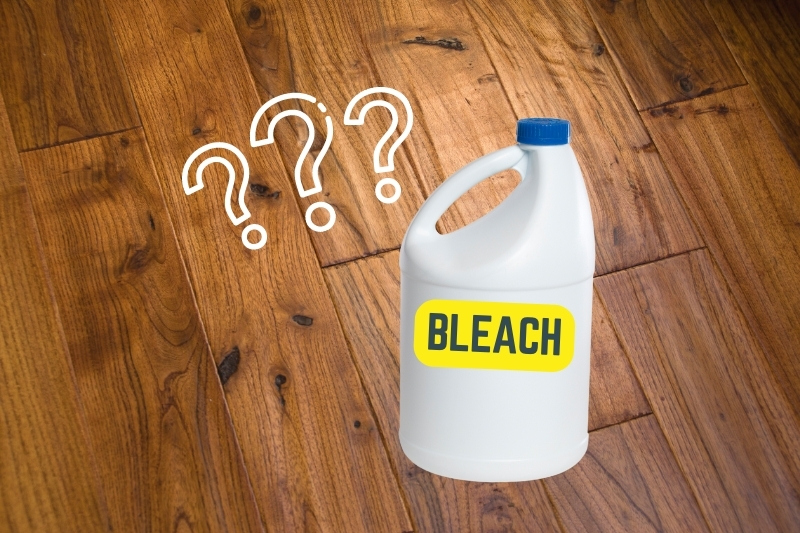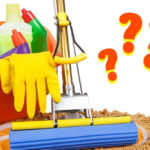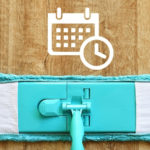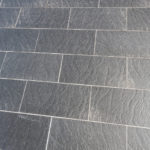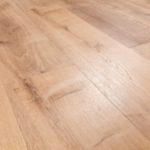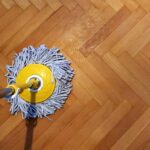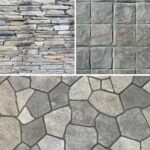Bleach is one of the strongest cleaning agents in the cleaning world! It can eradicate stains, disinfect various surfaces in a home, including those in the bathroom and kitchen, and can even whiten and brighten dulling laundry.
But can it be used on hardwood floors?
The answer: No bleach shouldn’t be used on hardwood floors.
You should clean your hardwood floors with a specialised cleaning solution or warm soapy water.
There’s no need to use harsh cleaning chemicals and abrasive tools because they’ll harm the floor!
The reasons for this are:
- Bleach weakens the wood at a chemical level and makes it extremely vulnerable to damage, stains and water, all of which can cause significant harm to the floor.
- Bleach will spoil the finish of a hardwood floor because it’ll remove any coating, shine and colour from it.
- As mentioned above, bleach will remove the protective coatings from most hardwood floors. This means that the wood is essentially bare, which again weakens it and exposes it to other potential problems. Namely, the wood will become porous, and it will take on water and stains far quicker than it usually would.
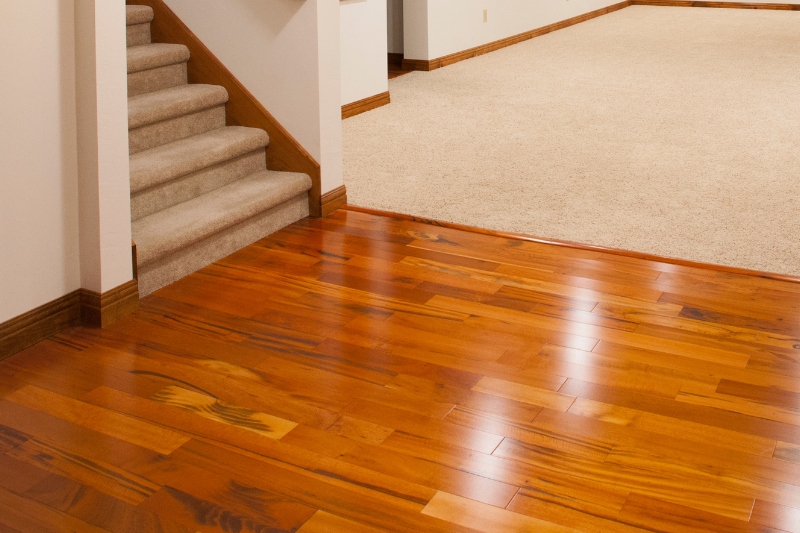
There are, however, some risk-takers out there that will claim that cleaning hardwood floors with bleach is absolutely fine.
But it’s always better to be cautious when it comes to cleaning wood floors because they’re usually expensive to buy and put down, and restoring them can be a load of hassle that you don’t want to put yourself through!
If you’re absolutely convinced that bleaching your floor is what you must do, know that you do this at your own risk.
You should also take note of the following points:
- Do a patch test first to see how your hardwood floor will react to the bleach.
- Make sure you dilute the bleach in plenty of water.
- Always wring your mop out before you start to mop the floor.
- When you’ve cleaned the entire surface in bleach, re-mop the surface, but this time only use plain water. You can repeat this step multiple times to ensure the surface is free from bleach but make sure you don’t saturate the floor, as this will create a whole host of new problems for you.
- Open plenty of windows.
- Keep pets and family members out of the room when you’re cleaning the wood floor and when it’s drying.
- Make sure you mop up any pools of liquid – big or small – as you clean the floor. You don’t want any standing puddles of bleach on your floor!
- If any part of your hardwood floor has lost its protective coating, don’t mop it with bleach. You will damage the floor if you do this.
What to Do If You Spill Bleach on a Hardwood Floor
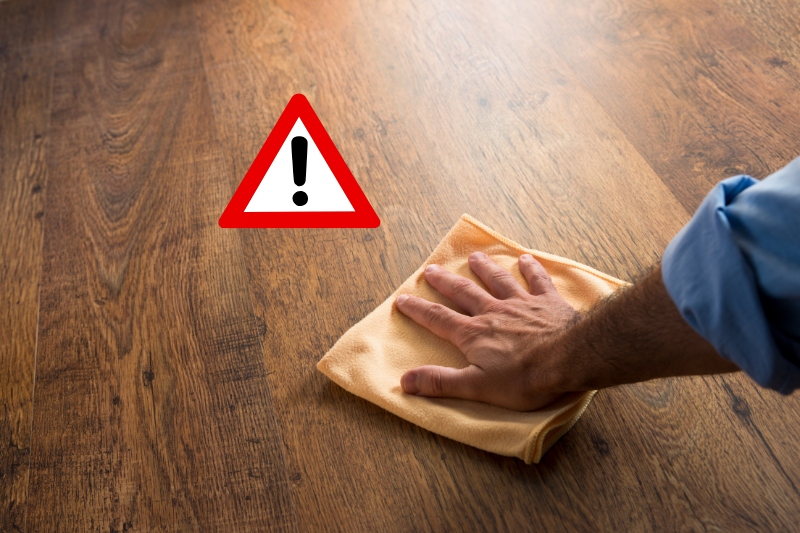
If you accidentally spill bleach on a hardwood floor, you must act fast and remove the mess before it has time to wreak havoc on your floor!
Steps to follow:
- Grab plenty of paper towels or old cloths and use them to soak up the bleach from the floor.
- You will also need to grab a bucket or rubbish sack.
- When soaking up the bleach, just blot the surface. Make sure you don’t scrub the floor because you could drive the bleach deeper into the wood.
- Pop your bleach-soaked items in the bucket/sack as you clean the floor so they don’t drip bleach everywhere.
- Grab some additional towels that have been soaked in plain water.
- Make sure the towels have been wrung out so they are damp!
- Lay the towels over the surface you’ve just cleaned.
- Press down gently on the towels so they soak up excess bleach.
- Repeat this process multiple times, so you dilute any remaining bleach and remove it from the floor.
- Wipe the floor with a dry towel and then leave it alone so it can dry properly.
- Inspect the floor when it’s dry. If there isn’t any damage, you’re a very lucky person. But if there is damage, you will need to sort it out (buy a repair kit or ask a professional for advice). If the damage is extreme, you may have to restore the floor.
Acting fast is critical: If you act quickly, you can limit the amount of damage to your floor. If you don’t react in time, this is when bigger and more troubling problems will occur.
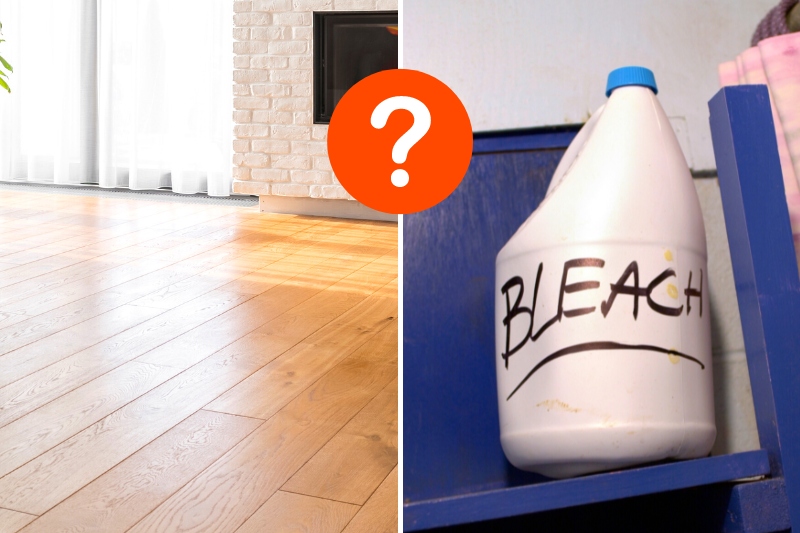
Can You Use Bleach on Real Hardwood Floors?
Real hardwood floors shouldn’t come into contact with bleach of any sort. If you clean real hardwood floors with bleach, even a diluted form of it, you run the risk of discolouring and warping the surface.
In addition, by cleaning a real hardwood floor with bleach, you’d strip any protective coating it had on it. The floor, in turn, would become very vulnerable as it would be more porous than usual and would stain and take on water very quickly.
Can You Clean Hardwood Floors with Diluted Bleach?
Bleach is a strong cleaning chemical that can damage hardwood floors, even when used in a diluted form.
It would be better to avoid using bleach, including diluted bleach, to clean your hardwood floors. You should stick to using official hardwood floor cleaners or soapy water instead.
What Products Shouldn’t You Use on Hardwood Floors?
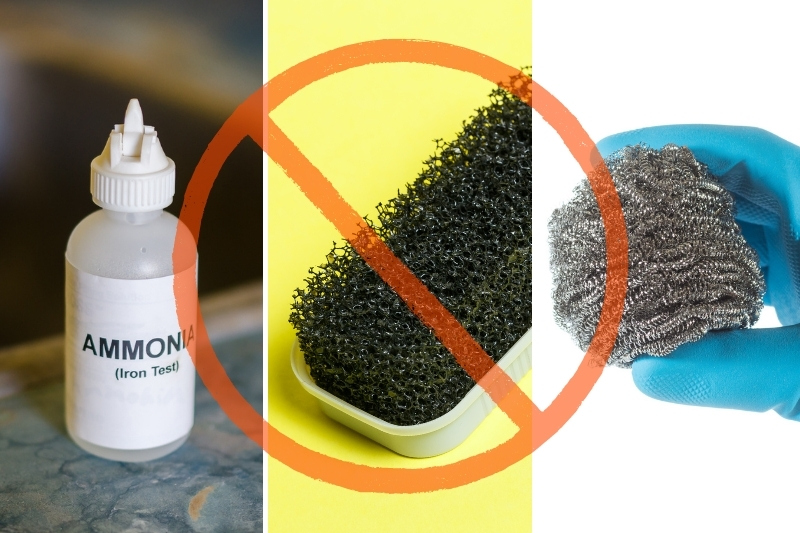
When it comes to cleaning hardwood floors, you should avoid using the following products:
- Ammonia/goods containing ammonia.
- Alkaline-based products.
- Other types of floor cleaners, like tile cleaners.
- Abrasive cleaning tools, like hard-bristled brushes and scourers.
The best products to use are official hardwood floor cleaners, mops, soft-bristled brushes, and a bit of warm soapy water!
Cleaning Solid Wood Floors
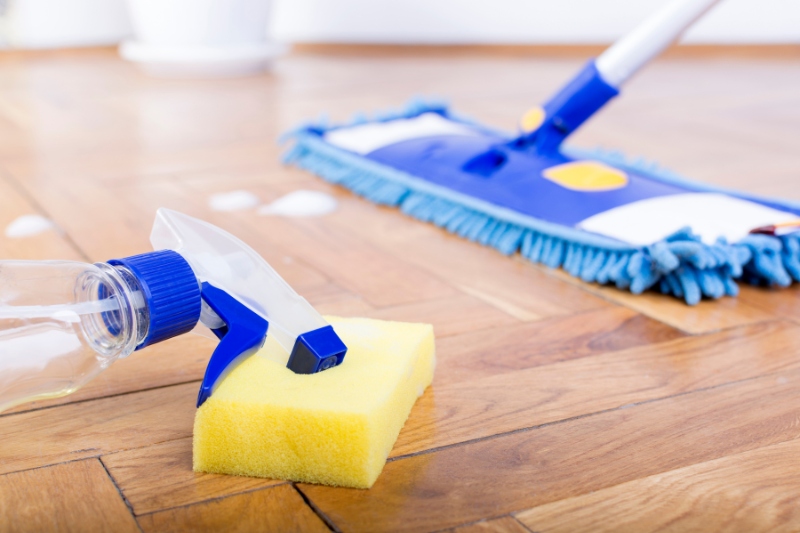
Cleaning solid wood flooring is a relatively straightforward process that shouldn’t take long to complete as long as you stay on top of the cleaning.
The main points to remember when cleaning hardwood floors are:
- Don’t get the floor too wet.
- Don’t use abrasive cleaning tools.
- Don’t use harsh chemicals to clean the floor.
- Clean as often as possible so you stop massive build-ups of dirt and stains from forming on your floor!
- Brush your floors, then clean them. The cleaning process will be easier if you remove chunks of debris from the floor first.

Bethan has a passion for exploring, reading, cooking and gardening! When she’s not creating culinary delights for her family, she’s concocting potions to keep her house clean!
